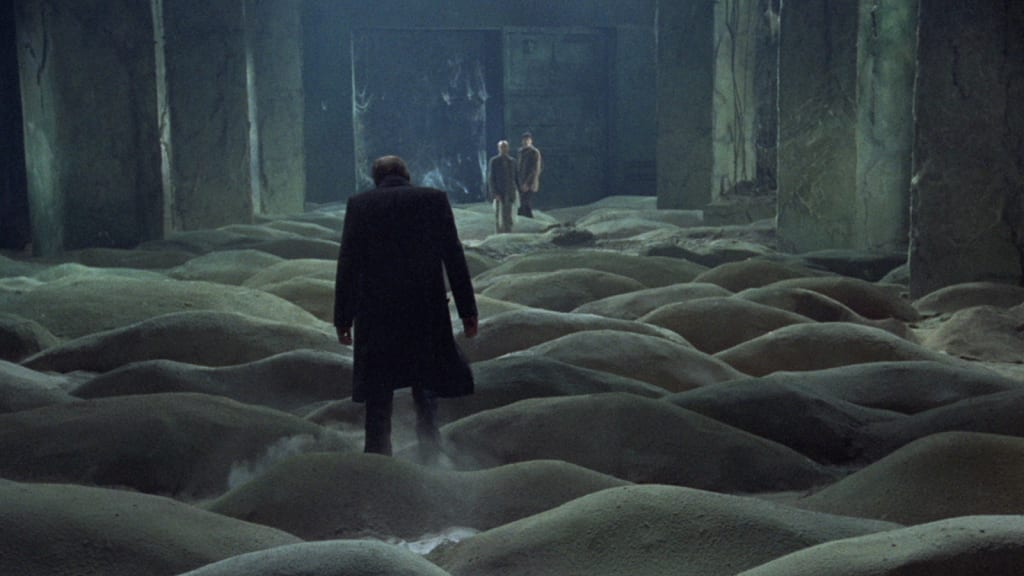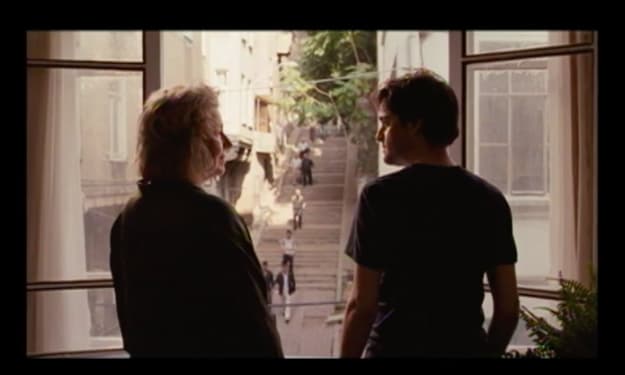Andrei Tarkovsky - Stalker(1979)
Film Review

"Andrei Tarkovsky is a miracle. For me, he is the greatest director; the one who invented a new language, true to the nature of the film, as it captures life as a reflection, like a dream" – Ingmar Bergman
"Stalker" is an author's film, allegorical and metaphorical, profoundly philosophical, in which an exceptional director uses the thematic pretext of that short story to convey a complex message formulated on several levels. Two backstage details must be known about Stalker. The fact that the first version of the filmed material was mostly destroyed due to an accident during development, gave Tarkovsky the opportunity to reassess some approaches and improve the quality of others in a second shoot. Another detail is that during filming, the director's health deteriorated severely, and he even suffered a heart attack. This event is noticeable from about halfway through the film, which becomes much more meditative and profound. In a recently published memoir, the Strugatsky brothers, who participated equally in writing the script, talk at length about this change in Tarkovsky's attitude, which they consider beneficial to the creation.
Andrei Tarkovsky approached cinema through writing. He conceived film scripts that he then wanted to adapt for the screen. But Tarkovsky is also a photographer, and a damn good one, claiming to be from the romantic part of photography. To better understand him, one should perhaps see his film "Mirror," a succession of autobiographical flashbacks that, for most critics, constitutes a monograph and, for the few (connoisseurs), an incomparable suite of replicas of famous works of art from all times, placed in the sequence of events that marked his childhood. All of these things together recall the collective unconscious announced by Jung. He says that in the mind of a single person are accumulated, at a level of consciousness that cannot be directly accessed, all the past experiences of all their predecessors. Tarkovsky, using metaphor, assimilates the events of his early youth with other similar events that triggered major emotional reactions in people exceptionally equipped to communicate them artistically at their best.
This is generally how Andrei Tarkovsky operates. He takes the most representative images from the collective intellect (the common fund of knowledge), processes them in his own style, and then reassembles them according to the recipes of confusing stories, without a precise ending, with many interpretations, but overwhelmingly empathic.
Now, about the film.
The Strugatsky brothers' novella that serves as the basis for the screenplay (entitled "Roadside Picnic") has little in common with the film's story, speaks of an extraterrestrial presence that camped for a few hours in several places on Earth for a brief stop, but leaving behind carelessly (as unfortunately happens too often) remnants of the repose. What remains is mysterious, supernatural, and incomprehensible to humans. Therefore, they rush to close the areas and subject them to harsh access restrictions until a better understanding of the events. The subtext is quite transparent and straightforward: What do ants think of what they find at the forest's edge after a human picnic?
Or more plainly: "Imagine a forest, a country road, a clearing. Cars drive off the country road into the clearing, and a group of young people gets out carrying bottles, baskets of food, radios, and cameras. They light fires, pitch tents, and turn on the music. In the morning, the cars drive away, the tents are left behind, and the fires are extinguished. The fauna, flora, and insects, which watched in horror through the long night, creep out from their hiding places. And what do they see? Gasoline spills and oil slicks on the water, heaps of garbage, spark plugs, oil filters, bitten-off chicken wings, and other leftovers..."
Breaking away from this parable, but accepting it as a starting point, Tarkovsky imagines the Zone as a place where there is a center that can fulfill any desire. Of course, he needs to explain the paranormal faculties of the Zone (which he borrows from the novella) and he also needs strong and believable characters (which are very difficult to find) who are in search of fulfilling a fundamental desire through a shortcut. It's no coincidence that they are the Writer and the Physicist. To avoid overloading the effort, Tarkovsky shifts the focus to a peripheral character in the story, the Guide, the only one who can provide a connection between those who desire and the one who can fulfill (the center of desires in this case). In the end, he even creates a very well-defined character out of it, as he is more of a guide on the path to the heart of the Zone, which only the pure can identify and follow. Because the Zone is dangerous. It has been said that "the aggression of the Zone would only be a response, a defense of nature (or a withdrawal of God) in the face of human aggression."
I don't know if the things I'm saying about the film have already been said, and I don't know if what I discovered in it corresponds to the message Tarkovsky wanted to convey, but I know one thing for sure: this film is mostly related to imagery, to the sequence of thoughtfully designed frames (with great psychological impact) and with a devastating effect on the viewer.
The black-and-white/color alternation (everything outside the Zone is black-and-white or sepia/ everything inside the Zone is in vivid colors) enhances this effect, and the multitude of static frames taken in minutes-long traveling shots allows the viewer to see things in the film beyond the screen; events and feelings from the depths of each person's being. Ultimately, it is a skillful and sophisticated invitation to introspection. That's why The Stalker is not a film that can be watched anytime and anyhow. It requires a certain state of mind and complete detachment. But also a lot of patience and attention.
PS. The ending of the film, which should be a big surprise (after many twists and turns, none of the protagonists have any desires left) fails to surprise anyone. Because exhausted from the journey, the viewer no longer believes in anything other than the value of the attempt and its beauty.
PS2. Of course, this film, like any other masterpiece, does its work on you, it transforms and changes you, and it elevates and liberates you. My advice is to watch The Stalker as if you were browsing through an album of reproductions from classical and contemporary paintings... with the same concentration and equal attention to both the big picture and the details. Pay attention to the soundtrack as well, treated in the same pattern, mixing the poems of Fyodor Tyutchev and Arseny Tarkovsky (the director's father, a war hero and invalid), in a magical overlay/melange, with music by Ravel, Eduard Artemiev, Beethoven, in the most complimentary way possible, to the images on the screen.
That's all.
About the Creator
Andreea Sorm
Revolutionary spirit. AI contributor. Badass Engineer. Struggling millennial. Post-modern feminist.
YouTube - Chiarra AI






Comments
There are no comments for this story
Be the first to respond and start the conversation.